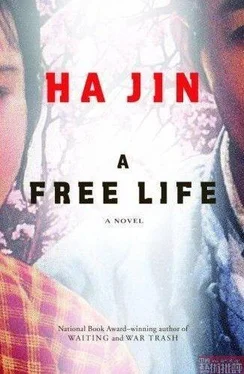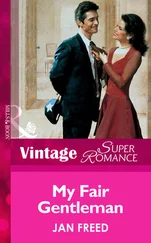The boy in a sailor suit smiled, whimpering "Mama, mama" while pressing his face against her chest as if shy of being seen by others. He then turned to Nan, but his face registered no recognition.
" This is your daddy, Taotao," his mother said.
The boy looked at Nan again and gave a hesitant smile, as if his father were a bigger friend being introduced to him. Meanwhile, Pingping went on kissing him and patting his back and stroking his head.
The two stewardesses asked for Nan 's ID, and he produced his driver's license. They compared his name with their paperwork, then congratulated him on the family's reunion.
"He was fine on the plane, very quiet, but a little scared," said the short woman, who looked Malaysian. She handed Nan the suitcase.
He held it with both hands. "Sank you for taking care of him on zer way."
"Our pleasure," said the blonde, who wore mascara and had permed hair, her face crinkling a little as she smiled. "It's wonderful to see a family reunited."
Before Pingping could say anything, the women left as if this were their routine work. "Thank you!" she cried at last. They turned their heads and waved at her, then disappeared past the gate.
NAN had not seen his son for four years. Taotao seemed frailer than in the photos, though he was definitely more handsome, with a thin nose and dark brown eyes, like his mother's. Together the Wus headed for the bus stop, both parents holding the child's hands. Approaching an automatic door, the boy somehow stopped and wouldn't exit the building. He asked his mother, "When are we going back?" His Mandarin had a slight Shandong accent, since he had lived with Pingping's parents.
"What? What are you talking about?" said Pingping.
"Uncle and Aunt are waiting for us in Shanghai."
"Really?"
"Yes, they'll meet us there." "Who said that?"
"They told me to come and take both of you back. Let's go home now."
"Can't we stay just another day?" Nan stepped in, having realized that his in-laws must have tricked Taotao into traveling with the flight attendants.
"No, I want to go home."
Nan forced a smile and choked back a wave of misery. "Don't you want to see dolphins and whales?" he asked. " Real ones?" " Sure. "
" Where are they? Here?"
"No, we're going to make a stop in a city called Boston, where there're lots of whales and dolphins. Don't you want to see them?"
"Yes," Pingping chimed in. "We'll visit a few places before heading for home."
"All right?" Nan added.
The boy looked uncertain. "Then we'd better let Uncle and Aunt know our plan. They're still waiting for us at the Shanghai airport."
"I'll call them. Don't worry," said his father.
So Taotao agreed to return to the hotel with them. Nan was carrying him piggyback on the way to the bus stop while Pingping went on talking with him, asking what food he had eaten on the plane and whether he had been airsick. The din of the traffic muffled the voices of mother and son, and Nan couldn't hear all their conversation. His mind was full, in turmoil; but he was happy. His child had come. He was sure that, eventually, the boy would become an American.
But what about himself? He was uncertain of his future and what to do about his life, not to mention his marriage. The truth was that he just didn't love his wife that much, and she knew it. Pingping knew he was still enamored of his ex-girlfriend, Beina, though that woman was far away in China. It seemed very likely to Nan that Pingping might walk out on him one of these days. Yet now he was all the more convinced that they must live in this country to let their son grow into an American. He must make sure that Taotao would stay out of the cycle of violence that had beset their native land for centuries. The boy must be spared the endless, gratuitous suffering to which the Chinese were as accustomed as if their whole existence depended on it. By any means, the boy must live a life different from his parents' and take this land to be his country! Nan felt sad and glad at the same time, touched by the self-sacrifice he believed he would be making for his child.
On the bus Taotao was sitting on his mother's lap. A moment after they pulled out of the airport, to his parents' astonishment, the boy said, "Mama, there was a big fight in Beijing, do you know? Hundreds of uncles in the People's Liberation Army were killed."
" It was the soldiers who shot a great many civilians," his father corrected him.
"No, I saw on TV bad eggs attacking the army. They burned tanks and overturned trucks. Grandpa said those were thugs and must be suppressed."
"Taotao, Dad is right," his mother broke in. "The People's Army has changed and killed a lot of common people, people like us."
That silenced the boy, who looked cross, biting his lips, which puffed up a little. He stayed quiet the rest of the way.
It was two o'clock. They decided not to return to the hotel directly, and instead went to Chinatown for lunch. At a fruit stand Nan bought a pound of Rainier cherries for Taotao, who had never seen such yellow cherries, each as big as a pigeon's egg. Pingping rinsed a handful of them with the water from the bottle she carried. The boy ate a few and found them delicious; he saved the rest for his younger cousin Binbin, the daughter of Pingping's sister. He didn't want to throw away the stones and instead slotted them into the patch pocket on his jacket so that he could plant them in his grandparents' front yard, where there were already two apricot trees.
They didn't go deep into Chinatown but just entered a Cantonese restaurant close to the ceramic-tiled archway at the intersection of Bush and Grand. A stout middle-aged woman showed them to a table beside a window. As soon as they sat down, she returned with a pot of red tea and three cups and put everything before them. She glanced at them quizzically and seemed to be wondering why they were dining at such a place. She must have known they were FOJs- fresh off the jet-who would scrimp on food to save every penny.
After looking through the menu and consulting Pingping, Nan settled on two dishes and a soup and ordered all in the large size. He avoided the cheaper dishes on purpose, though he had no idea what "Moo Goo Gai Pan" and "Seafood and Tofu Casserole" tasted like. They sounded strange to him. The "Three Delicious Ingredient Soup" didn't make much sense either, but, unable to speak Cantonese and ashamed of asking what was in it, he just ordered it. He disliked these nebulous names. Why not call things what they were? The Chinese here just wanted everything to sound fancy and exotic.
The waitress smirked, collected the menus, and left.
"What's that?" Taotao asked his mother, pointing at half a side of roast pork hanging behind glass above a counter.
" Golden pig," she answered.
"And those?"
"Roast ducks? Want some?"
"Not now."
" It tastes no good, too fatty," Nan said. Then he chuckled as he remembered that when Taotao was a baby, barely able to use a spoon, the boy had liked meat and seafood so much that he'd hog them at a meal and even declare, "I want to eat it all. I don't leave any for others."
Nan looked around and saw a few people eating noodles and won-tons. The Cantonese ate lightly at lunch and wouldn't order so much food as he had. The air was rife with fried scallion and soy sauce. Nan usually liked those smells in a Chinese restaurant, but today the usual aromas somehow irritated his nose. Feeling that his hands were a little sticky, he got up and went to the restroom to wash them.
On his way back to the table, he caught sight of the community newspaper, Asian Voice, stacked on a steel rack near the restaurant's side entrance. He picked up a copy. Sitting down, he opened the paper and saw a full page of photographs of some recent scenes from Beijing. One of them showed a naked soldier hanging, by a piece of iron wire, on the window frame of a burned bus, his feet dangling and still in boots. Beside him stood a rectangle of cardboard bearing two vertical lines of words, which read: "He killed five civilians and was caught when he ran out of bullets. He got his comeuppance!"
Читать дальше












